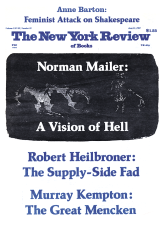On ‘Women’
It really was years, many years, before I began to actually realize that the women in my life—the prostitutes as well as the soft, pretty girls who giggled and teased me so much, my several wives and those of my friends—it was years before I realized that they were not women, but men; years before I assimilated the notion that this was unnatural. I still only know this intellectually, for the most part—but for the small part that remains to my ken, I know it is like a hammer blow to my temple and the shame I feel is profound. Not because of the thing itself, the sexual love I have enjoyed with these women (some so devoted it aches to recall it), but because of shame—and anger—that the world could so intimately betray me; so profoundly touch and move me—and then laugh at me and accuse my soul of a sickness, when that sickness has rescued me from mental derangement and despairs so black as to cast this night that surrounds us in prison into day.
I do not mean to say I never knew the physical difference—no one but an imbecile could make such a claim. I took it, without reflection or the slightest doubt, that this was a natural sex that emerged within the society of men, with attributes that naturally complemented masculine attributes. I thought it was a natural phenomenon in the society of women as well. The attributes were feminine and so there seemed no gross misrepresentation of facts to call them (among us men) “women.” I suppose I was, naturally enough, entertaining the notion, talked about in free society, of a “third sex.”
All this must sound very odd and incredible to a free person, but such it was. Such it is for most of us, even today. Today I cannot say the “women” in my life were all mincing imitations of real women. Those, in fact, aroused my active distrust instinctively—the way, I suppose, a cheap-looking and fast-talking obvious whore makes a man reach for and pat his wallet, to make sure it has not been lifted. Many of my “women” had merely the appearance of handsome, extremely neat, and polite young men. I have learned, analyzing my feelings today, that those attributes I called feminine a moment ago were not feminine in any way as it appears in the real female sex. These attributes seem now merely a tendency to need, to depend on another man; to need never to become a rival or to compete with other men in the pursuits men, among themselves, engage in. It was, it occurs to me now, almost boyish—not really feminine at all.
This is the way it always was, even in the State Industrial School for Boys—a penal institution for juvenile delinquents—where I served five years, from age twelve to age seventeen. They were the possession and sign of manhood and it never occurred to any of us that this was strange and unnatural. It is how I grew up—a natural part of my life in prison.
It was difficult for me to grasp the definition of the clinical term “homosexual”—and when I finally did it devastated me, as I said.
The definitions of many other words, by the way, devastated and shook me just as painfully. If I have really finally achieved even a small consciousness of the world—of this earth peopled with living, breathing societies—I believe I owe it to words; words are what allowed me to grope my way toward whatever consciousness of my condition I have today. Allowed me to “rail, rail against the night”—after the words of Dylan Thomas.
—From a letter.
On ‘Nature’
…There was something else Atlanta had for me. It was the best, my first experience of nature in my life. After supper I would mosey, alone, out to the main yard and those were the best moments of my life in Atlanta. Indeed, maybe among the best of spiritual experiences my sorry existence has known. The worst of the heat of the day would snuggle into the rich, moist ground and a quietude all prisoners seemed to respect filled the yard. At most you could detect only a few inmates on the yard, and they were always distant, slowly moving figures. When dusk would begin to lower and bloom in grey and purple hues, giving a thick texture to the heavens, it brought the sky down somehow so close it seemed to graze the earth and absorb me in its folds. I remember being wrapped in the fragrant, warm bouquets of magnolia and peach blossoms and the wet essence of lilac saturating the air as the evening slowly settled across the wide prison yard. I felt clean, like a babe again. I never knew evenings like that existed, evenings that never smelled of rusted steel and felt like grainy concrete dust; evenings that irritated your eyes, as if they were dry and tired.
Advertisement
—From a memoir of the Atlanta federal penitentiary, to be published
in June in the Atlanta Weekly of the Atlanta Journal-Constitution.
This Issue
June 11, 1981



